Sleep quality is essential for our health and overall well-being. The lack of it can cause many health-related problems, both physically and mentally, all of which are getting more media attention these days. People are all looking for quick fixes, and turning to old stand-bys like warm milk, and even hot chocolate.
If you're here because you're looking to find the answer to the question— can hot chocolate help me sleep? The short answer is yes. As I get further into my Master's of Science in Nutrition, I'm more deeply understanding the connection between what we eat & drink and the quality of our lives, which extends to our sleep quality.
The ingredients in hot chocolate actually contain compounds that may help the body settle in for the night. So, drinking hot chocolate before bedtime may be worth a try, but why exactly does it make you sleepy? Below I explain the hows, the whys, and the amount of hot chocolate to drink.
However, if you're dealing with a deeper sleep issue, this is not a long-term solution, and it's best to consult with a sleep expert.
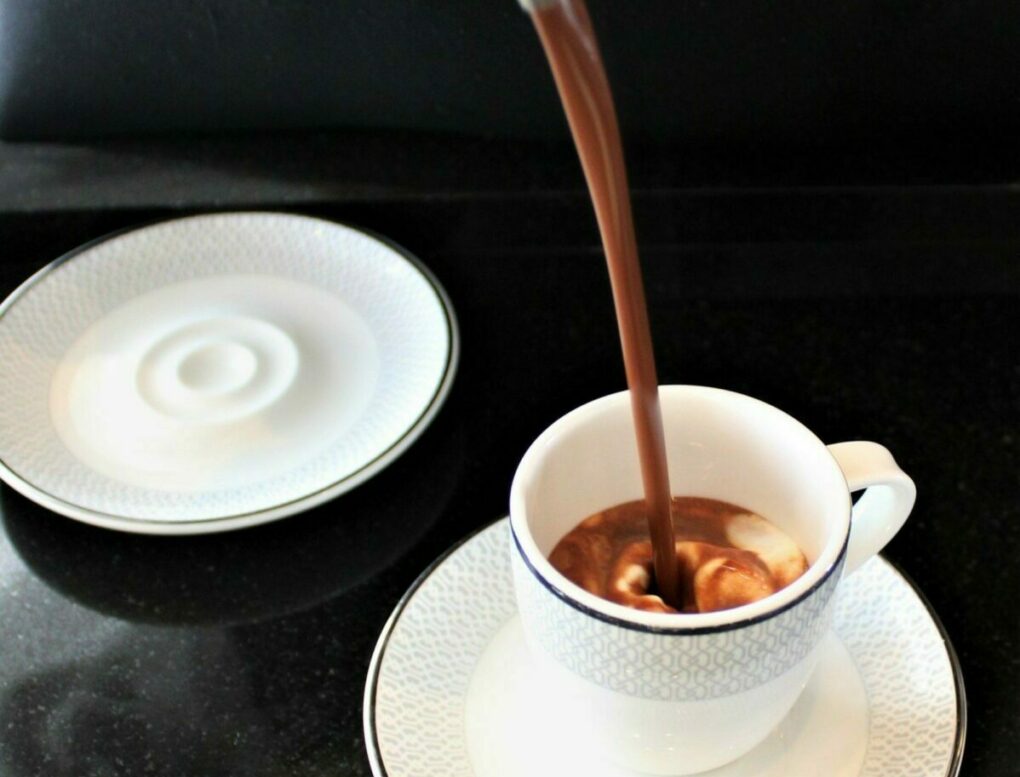
Jump To
The Science Behind Hot Chocolate and Sleep
Chocolate is normally combined with sugar and sometimes milk to make a hot chocolate that suits the tastes of the drinker (for example, I like mine with dark chocolate). This beverage has long-been a home remedy for kids who can't or won't sleep, as well as any adult's sleep aid to soothe what ails you.
While there's no clear link between hot chocolate and sleep, limited research suggests that the individual ingredients it contains may help with sleep. Below we discuss the typical ingredients in a cup of hot chocolate that may promote sleep, as well as highlight current research looking into them.
Key Components of Hot Chocolate
Hot chocolate's three main ingredients are milk, sugar, and cacao. Each one may be contributing to encouraging sleep and relaxation, depending on what form you use to make your cup of cocoa.
Component: Milk
At least in the US, a cup of milk before bedtime has always been a common pre-bedtime ritual for helping with sleep. This ties in well with the milk content of hot chocolate, as it's thought to be the actual ingredient that "induces sleep" in the drink, thanks to several of its properties.
In one survey of senior Japanese adults, a combination of high physical activity and milk and dairy product consumption was associated with enhanced sleep quality. This means the claim that a person with high milk consumption in addition to an active lifestyle will have better sleep quality is well within reason.
However milk is also one of our main sources of calcium, which is thought to contribute to better sleep quality. According to newer research from the Journal of Sleep Research in 2017, which reviewed the evidence on the relationship between calcium and sleep, calcium may play a role in the regulation of the sleep-wake cycle and promote better sleep.
Additionally, research published in the Journal of Research in Medical Sciences in 2012 studied the effect of calcium on sleep in a young adult population. It was, in fact, deduced that calcium supplementation decreased the use of sleep medications and lowered the likelihood of daytime dysfunction.
As a whole, calcium supplementation was found to increase sleep quality and decrease the time it took participants to fall asleep. To get a better idea as to why milk may induce sleep, let's look at the active ingredients it contains that promote rest.
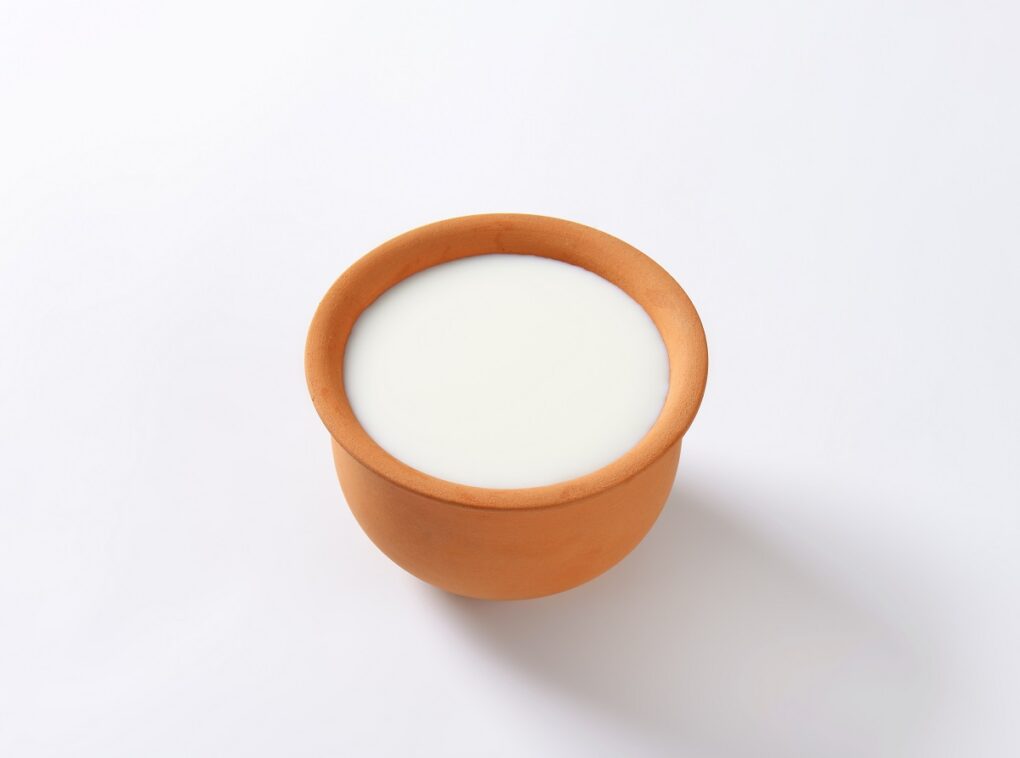
Tryptophan in Milk
Milk contains tryptophan, an essential amino acid (protein) that's said to make you feel sleepy in larger doses, which has been my personal experieince, as well (I take tryptophan supplements before bed). It works because it functions as a precursor to the production of serotonin, a neurotransmitter linked to mood control and feelings of well-being.
After tryptophan is ingested, it's converted into the molecule 5-HTP, which then forms serotonin. This then works with enzymes to produce melatonin, a hormone that regulates your sleep-wake cycle by making you feel tired at night.
L-tryptophan and D-tryptophan are the two forms of tryptophan. Both perform the same basic tasks but differ somewhat at the molecular level.
L-tryptophan is a necessary amino acid for the body to generate serotonin, a neurotransmitter that regulates mood, appetite, and sleep. It's also the major form of tryptophan in milk and is thought to contribute to the relaxing and sleep-inducing properties of milk.
D-tryptophan is also an essential amino acid, used as a dietary supplement and in nutritional research, specifically in chickens and rats. In studies it was shown to slow the progression of some chronic diseases after ingestion, indicating the need for additional clinical research to evaluate the therapeutic potential of low-cost, high-tryptophan diets.
Tryptophan, like other essential amino acids, must be eaten as part of a healthy diet, as the body cannot create it independently. These ingredients for a healthy diet can be found in whole and processed food, including different kinds of fruits (such as cacao fruit) and vegetables, nuts and seeds, dairy, and meats such as turkey and lobster.
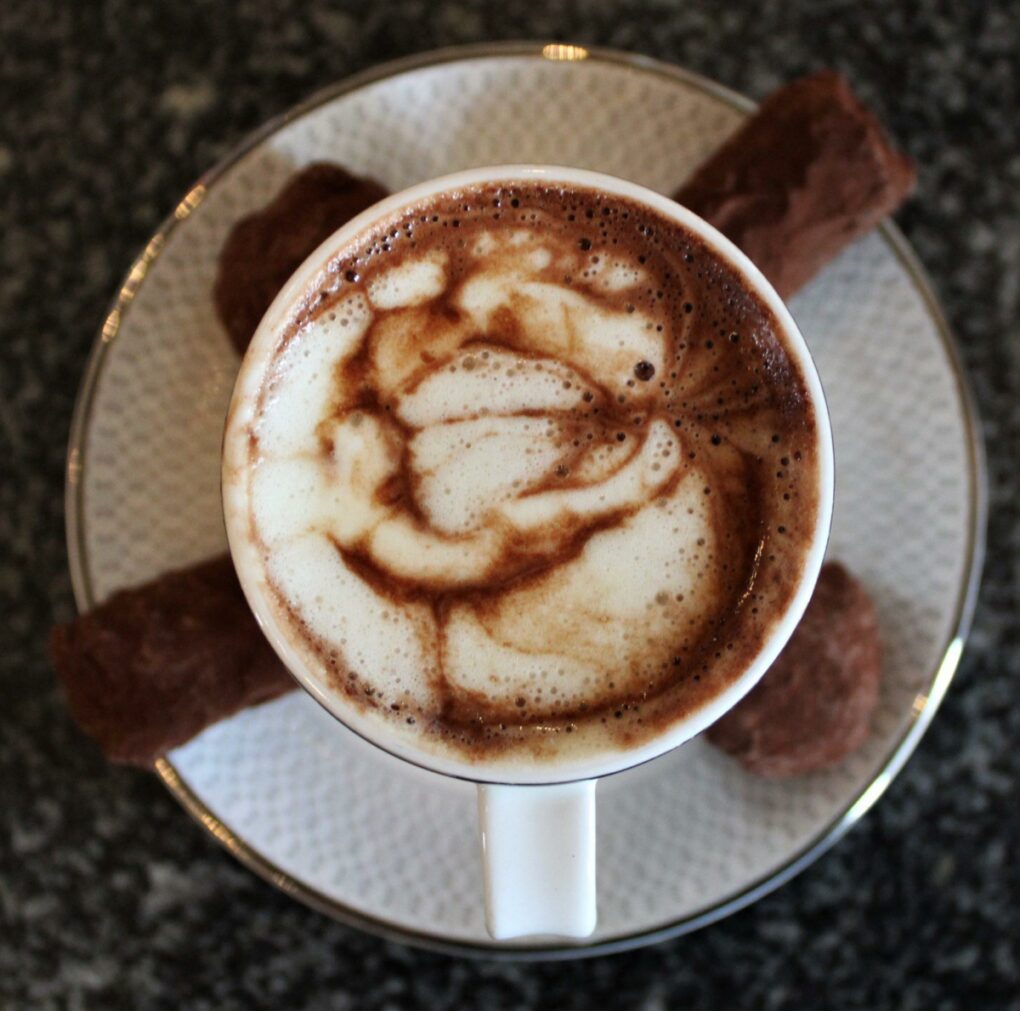
Component: Sugar
Sugar is another important component of hot chocolate that may help with relaxation and sleep quality. Although it's not the healthiest ingredient, there is still some connection between sugar and better sleep.
Firstly, sugar stimulates the creation of insulin, which helps our bodies prepare for sleep. When insulin is released, it gives better access for tryptophan to be transported to the brain, thereby promoting relaxation and sleep (which is also part of the positive association we have with sugar).
Eating excessive amounts of sugar to get a better night's sleep, though, will only increase blood sugar levels, which will actually interfere with sleep. Its use in hot chocolate means that you should drink it in moderation, and roughly an hour before bedtime to minimize blood sugar abnormalities that could interrupt the sleep cycle.
Component: Cacao
A study that fed a high-fat, high-sucrose diet supplemented with 2.0% natural cocoa to mice revealed that cocoa may help with sleeplessness brought on by stress.
This could be brought about by the active ingredients in cacao, such as tryptophan, theobromine, magnesium, antioxidants, and caffeine, but research results vary. Below I further discuss the active ingredients in cacao that may affect your sleep.
Tryptophan and Cacao
As mentioned above, tryptophan is an amino acid found in milk and cacao that stimulates serotonin and melatonin production upon consumption. These activities happen in the brain, leading to sensations of relaxation, tranquility, and sleep.
Refer to the tryptophan in milk section for a more in-depth look as to what it is. However, a lack of tryptophan in the diet can also contribute to low serotonin production, so while supplemental tryptophan may help induce serotonin production, it may also just help better balance out your natural levels.
Albeit, the amount of tryptophan in chocolate varies by variety and quantity (it may contain up to 18 milligrams per ounce), thereby affecting different people in diverse ways.
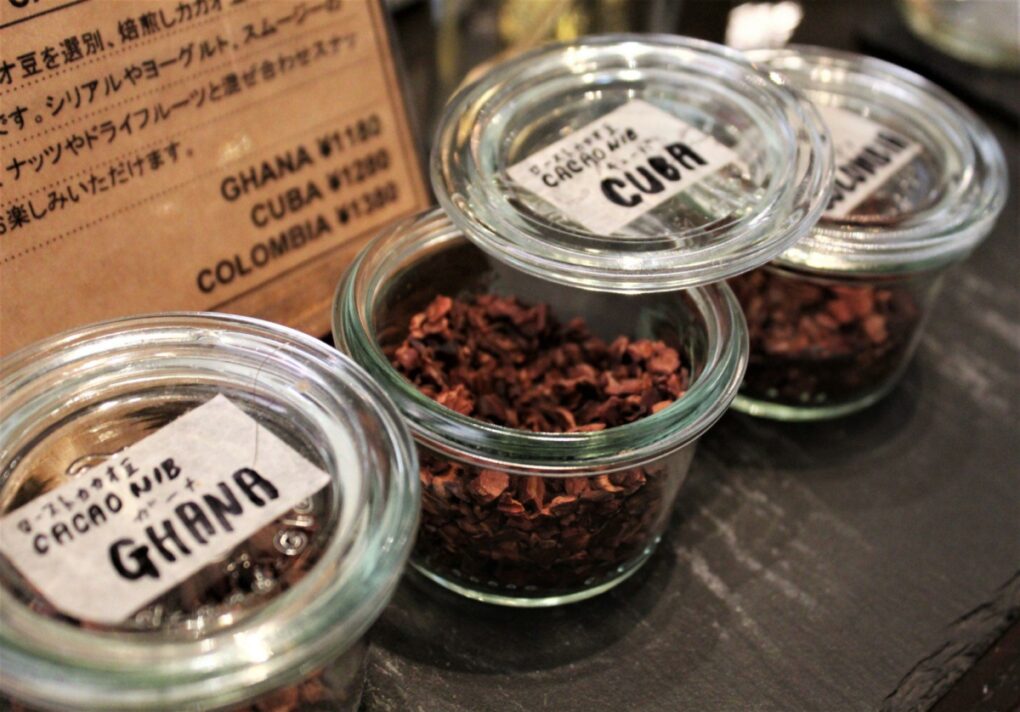
Theobromine in Cacao
Theobromine is a natural stimulant found in chocolate that improves mood, rapidly induces a sense of well-being, and contributes to mental alertness. While it's not a known sleep aid, some people claim that eating a piece of chocolate before bedtime helps them wind down.
If you also enjoy a chocolate square or two before bed, this study found that theobromine, the major active alkaloid in chocolate, not only improves mental alertness throughout the day but may also improve restful sleep.
It's found in higher quantities in dark chocolate than in milk or white chocolate, accounting for 1-2.5% of the weight of a normal dark chocolate bar. And despite being in the same chemical family as caffeine, theobromine does not stimulate the central nervous system.
It functions as a muscle relaxant while also increasing and regulating cardiovascular activity. It has also been linked to various other health advantages, including immune regulation, fighting inflammation, neuroprotection, managing oxidative stress, weight loss, and diabetes management.
Magnesium in Cacao
Magnesium is an important component of cocoa, an essential trace nutrient involved in numerous body activities, such as muscle and neuron function, blood sugar control, and blood pressure regulation.
It's also a natural muscle relaxant that can help to alleviate anxiety, promote tranquility, and has long been connected to improved sleep quality.

Polyphenol and Flavonoids
Flavanols— a type of flavonoid— are natural antioxidants found in cocoa solids. They've been linked to numerous health advantages, including enhanced heart health, lower inflammation, reduced stress, and increased cognitive performance.
Though chocolate also contains polyphenols, which are antioxidants connected to decreased inflammation, enhanced heart health, and a lower risk of chronic diseases, including cancer and Alzheimer's.
Consuming cacao-rich products has been linked to lower blood pressure and reduced risk of cardiovascular disease due to this high antioxidant content. The conneciton is in the reduction in blood pressure, with which individuals feel more relaxed, making it easier to fall asleep.
Caffeine in Cacao
Caffeine is a natural stimulant that can boost mood, mental alertness, and energy levels. However, chocolate only contains a small amount of it. Even in dark chocolate, the amount isn't much (certainly much less than a cup of coffee).
Caffeine works differently than the rest of the active ingredients mentioned because it works directly on the central nervous system, making us more "alert." And when consumed in excess, it tends to make you more active or jittery. So in essence, caffeine doesn't actually help us in falling asleep.
However our bodies all work differently, and some people claim that drinking coffee at night relaxes them, making it easier to sleep, so it's worth putting it in as a possible sleep aid. My grandparents both used to drink a cup of coffee right before bed when I was a kid, and never had trouble sleeping, so to each their own.
This can even be backed up chemically, as caffeine also boosts dopamine release into the prefrontal cortex, resulting in mood regulation, which may aid in relaxation and sleep. This is important, because dopamine-deficient depression is known to be a common cause of insomnia, causing sleeplessness.
In fact, in this 10-year study of more than 50,000 elderly women, caffeine consumption decreased depression in women who drank more coffee by 15% at 2-3 cups per day and 20% at more than 4 cups per day.
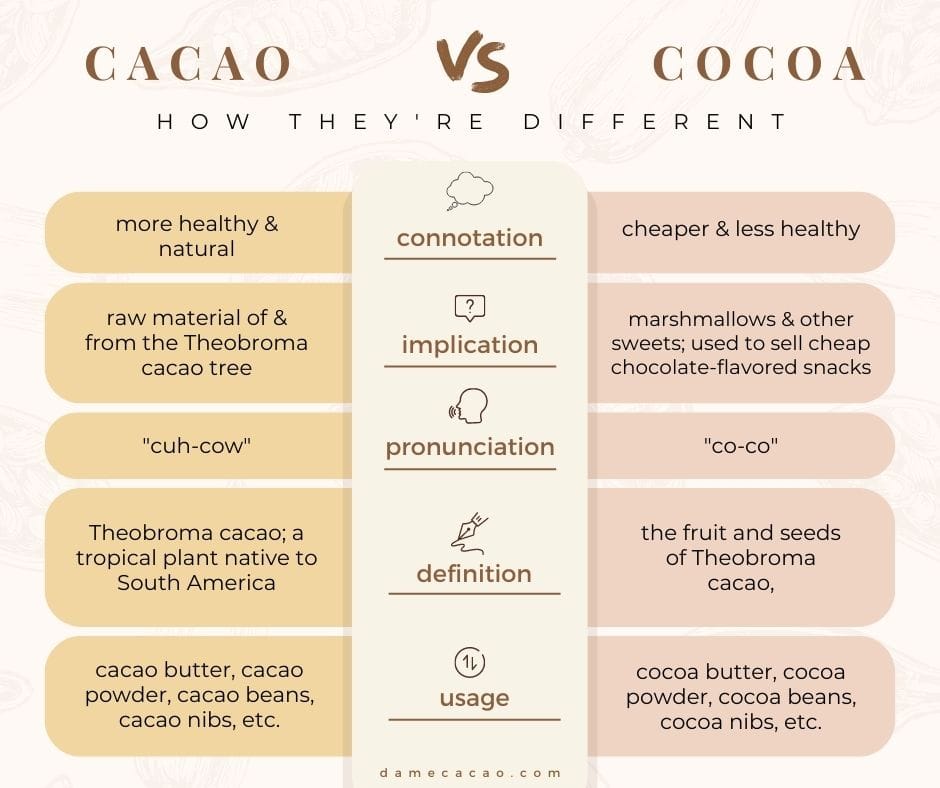
Can I Drink Hot Chocolate Before Bed?
So, after firmly establishing that hot chocolate could help certain individuals sleep better at night, let's hit onto some pros and cons as to why you may or may not drink it before sleeping.
For one, hot chocolate contains sugar, which elevates blood sugar and stimulates insulin production. When insulin is released, tryptophan, an amino acid found in milk and cocoa that helps induce sleep, is more easily delivered to the brain. This helps make you sleep sooner and more soundly, which is a very big pro.
Cacao beans are also a rich source of numerous healthy compounds, including antioxidants, with many health advantages of their own. One of these is mood regulation, which helps put us in the mood for sleep.
Now, let's move on to some cons. While chocolate can surely make you feel relaxed and tranquil, it's important to remember that moderation is key. The precise amount and combination of these active ingredients depend on the type and quantity of ingredients used to make your cup of hot cocoa.
A cup of hot cocoa may contain some potentially helpful components, but it's also still heavy in sugar and fat. Also, excessively drinking hot chocolate before bedtime can cause a sugar surge and interrupt your sleep.
Overindulging in chocolate can also result in weight gain and other health issues. So it's important not to drink too much. To induce relaxation before bed, a single 6 to 8-ounce cup of hot chocolate should suffice.
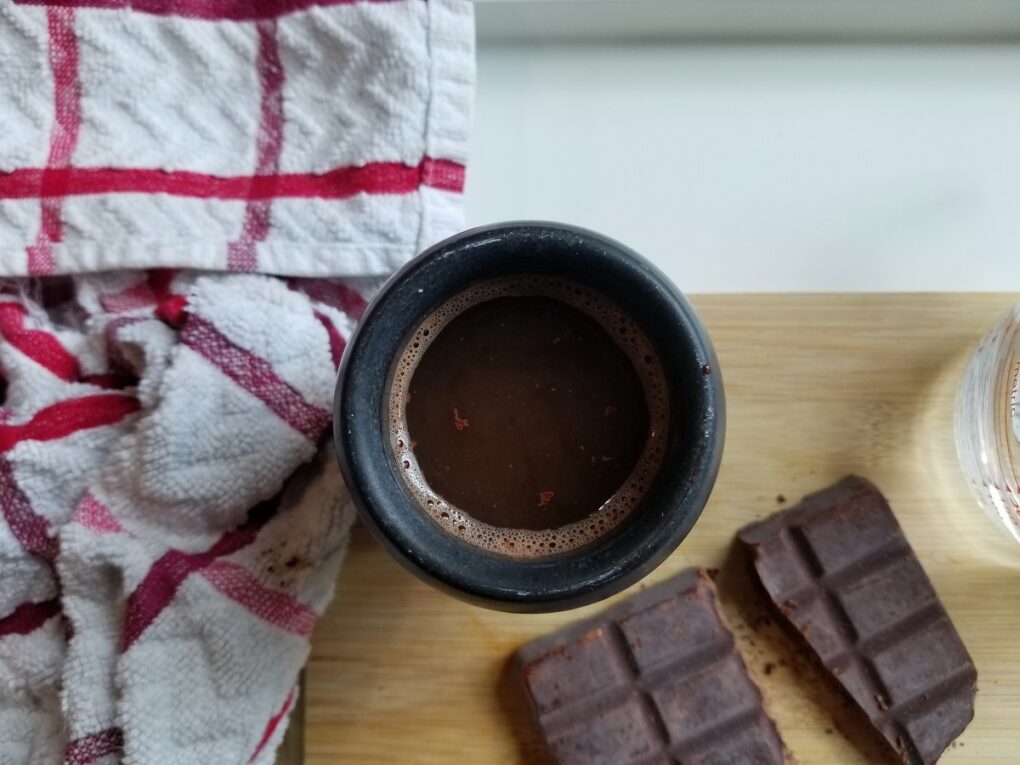
Other Methods for Improving Sleep
Apart from drinking hot cocoa before bed, there are many other ways to improve sleep quality. If you're having difficulty falling asleep, consider also taking some of these steps to incorporate more healthy lifestyle changes to your daily routine.
Stick to a consistent bedtime routine and sleep schedule
You can get more sleep and better sleep by maintaining a regular sleep schedule. The first thing to do is to set your wind-down time, which is the time at which you stop the day's activities and begin preparing for bed according to this schedule.
You can also create a simple bedtime routine and log these activities into a sleep diary. A regular sleep schedule aids in the maintenance of your heart's circadian rhythm, which is your body's internal clock's 24-hour cycle.
This means waking up at the same time each day, avoiding naps and erratic changes in your sleep schedule, such as working late some days or turning in late on weekends.
Avoid screen time a few hours before sleep
Staring at your devices before bed also makes it harder for you to fall asleep. This is because the blue light emitted by your screens, which is part of the light spectrum most active in our sleep cycle, stimulates part of the brain and restrains the production of melatonin.
This is the hormone that controls your sleep-wake cycle (aka circadian rhythm). So before bed, disconnect from all your laptops, phones, and tablets 2-3 hours before sleeping.

Practice relaxation techniques to clear your mind
When the mind is cluttered from a stressful day, or you're going through a particularly stressful period, it's important to calm the mind. Some ways to do this includes setting intentions, saying prayers, or keeping a journal to clear your head.
You can likewise meditate or adopt other mindfulness habits like visualization, breathwork, and muscle relaxation before bedtime. The goal is to clear the mind so that you can relax and not worry before getting ready for bed.
Set the mood of the bedroom to prepare for sleep
Make the bedroom a relaxing place where you can easily fall asleep by trying some of these things:
- Have a bedroom that's conducive to sleep. If you work in the same room during the day, turn down the temperature at night, dimming the lights or even just using candles (remember to extinguish them before heading to bed!).
- Try diffusing some calming essential oils or playing low, soft music.
- Manage the noise levels by investing in soundproofing if you live somewhere that's especially noisy at night.
- Lastly, get a comfortable mattress and bedding, including your pillow cases. These can also contribute to your quality of sleep.
Consult with your GP for a sleep aid recommendation
Before considering buying any sleep supplement, talk to your GP or healthcare provider. Your GP will try to identify if you really have a sleep problem or an underlying health condition. They may also refer you to a sleep medicine specialist and have you undergo a sleep test before discussing what you can do to help improve your sleep and what supplements to take.
Some sleep aid recommendations they may make come in the form of products. Though there isn't any conclusive evidence that natural ingredients in these products, like melatonin, ashwagandha, valerian, or chamomile tea, are useful for ordinary insomnia, some people still find relief in using them.
Aside from the natural ingredients, supplements like magnesium and vitamin B6 are also common recommendations. An example of this type of product would be 'Sleep Well Milk' with Valerian Root, released back in 2017 in the U.K.
This milk beverage is made using Jersey milk, which has 20% more tryptophan, calcium, vitamins, and minerals than other types of cow's milks. It also contains organic honey and valerian root, at a potency of 226 mg per 100 ml.
Why does this product contain this root? Well, valerian root has been utilized for thousands of years to promote relaxation and sleep. Though studies are limited, it's believed to function by gradually raising the level of the brain's GABA, which calms anxiety and helps us relax and get a better night's sleep.
If you're interested in learning more about this type of neurotransmitter-raising effect, including GABA and serotonin, I highly recommend reading the book The Mood Cure, which has been of immeasurable help for me to manage my own insomnia.
I've personally used both valerian root (which you need to take for a few weeks before seeing consistent effect) and tryptophan, and the latter has been immeasurably helpful for my sleep problems.
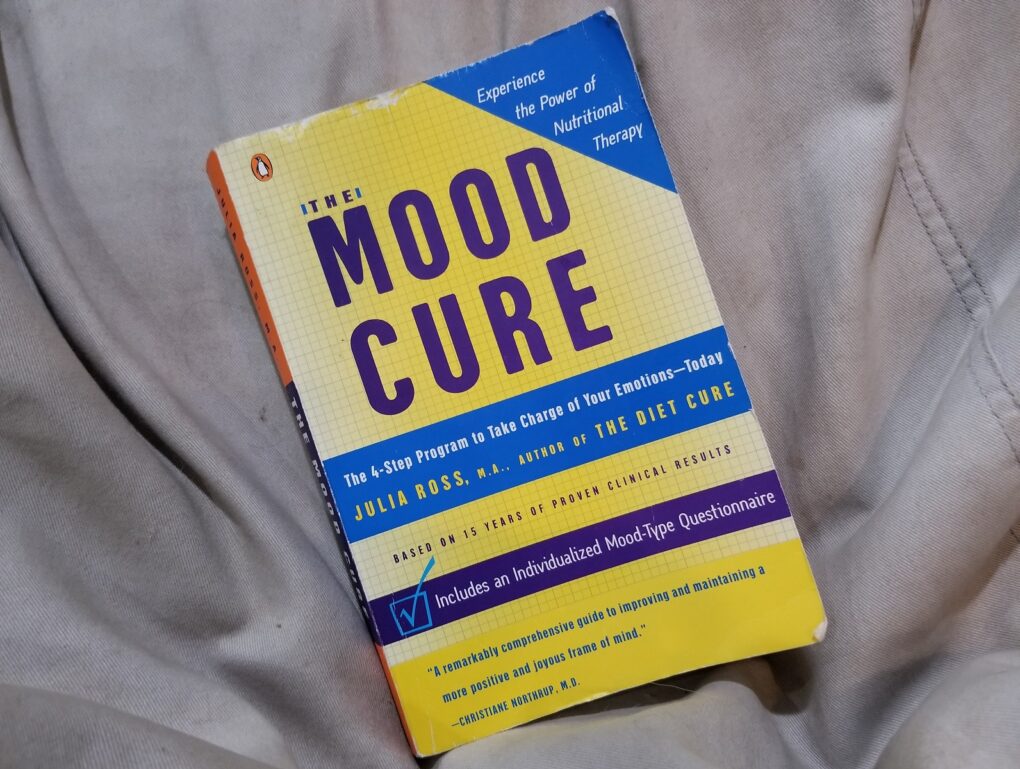
So, Can Hot Chocolate Aid Sleep?
The quick answer to this is yes. The basic components of hot chocolate— milk, sugar, and cacao— all contribute to relaxation and sleep. Milk includes tryptophan and calcium, sugar causes insulin release, and chocolate contains magnesium and flavanols.
The relaxing benefits of antioxidants, calcium, and tryptophan, as well as magnesium's increased serotonin and endorphin production, all lead to a more relaxed, tranquil frame of mind for sleeping.
However, each of these hot chocolate ingredients' compounds 'works' differently in everyone, because every body is different. There's still not enough scientific evidence to suggest that hot chocolate impacts everyone's sleep, yet it remains a common belief that it does.
Some people swear that a cup of hot chocolate helps them wind down for the day and sleep better at night, while others also say that even just the scent of chocolate relaxes them.
Curiously, this sleep-inducing aroma is backed up by a study undertaken by Neil Martin, a British psychologist at Middlesex University in Enfield. The smell of real chocolate reduced attentiveness in a group of 60 volunteers sniffing real foods (not just aromas) in a low-odor room.
But while a comforting cup of hot cocoa on a cold winter night is a fantastic way to unwind before bed, moderation is always best. It's advised to only drink a 6-to-8-ounce cup and do it at least an hour before bed to avoid disrupting sleep.
If you want to sleep well tonight, consider making a cup of this delicious healthy hot chocolate recipe that includes high-quality cacao powder, sea salt, milk, and a sweetener of your choice.
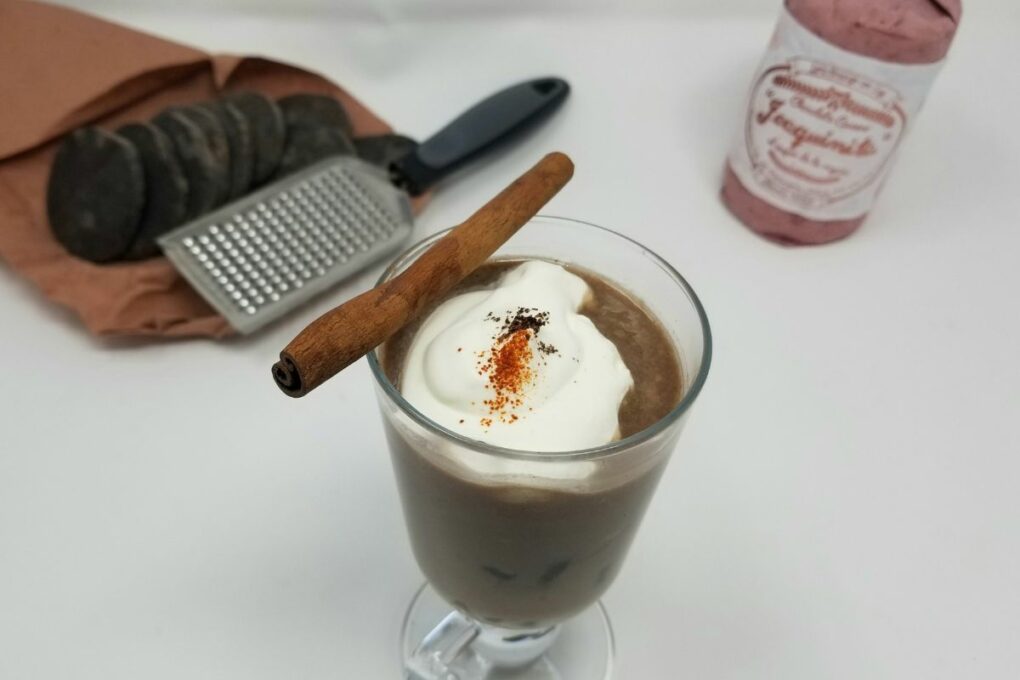
References (Citations)
Komada, Y., Okajima, I., Kuwata, T. (2020). The Effects of Milk and Dairy Products on Sleep: A Systematic Review, Int J Environ Res Public Health. 2020 Dec; 17(24): 9440. Published online 2020 Dec 16. doi: 10.3390/ijerph17249440
Kitano, N., Tsunoda, K., Tsuji, T., Osuka, Y., Jindo, T., Tanaka, K., & Okura, T. (2014). Association between difficulty initiating sleep in older adults and the combination of leisure-time physical activity and consumption of milk and milk products: a cross-sectional study. BMC geriatrics, 14, 118. https://doi.org/10.1186/1471-2318-14-118
Katsutaka Oishi, Hiroki Okauchi, Saori Yamamoto, Sayaka Higo-Yamamoto. (2020). Dietary natural cocoa ameliorates disrupted circadian rhythms in locomotor activity and sleep-wake cycles in mice with chronic sleep disorders caused by psychophysiological stress, Nutrition, Volumes 75–76, 110751, ISSN 0899-9007, https://doi.org/10.1016/j.nut.2020.110751
Boolani, A., Lindheimer, J.B., Loy, B.D. et al. Acute effects of brewed cocoa consumption on attention, motivation to perform cognitive work and feelings of anxiety, energy and fatigue: a randomized, placebo-controlled crossover experiment. BMC Nutr 3, 8 (2017). https://doi.org/10.1186/s40795-016-0117-z
Abbasi, B., Kimiagar, M., Sadeghniiat, K., Shirazi, M. M., Hedayati, M., & Rashidkhani, B. (2012). The effect of magnesium supplementation on primary insomnia in elderly: A double-blind placebo-controlled clinical trial. Journal of research in medical sciences : the official journal of Isfahan University of Medical Sciences, 17(12), 1161–1169. https://pubmed.ncbi.nlm.nih.gov/23853635/
Sathyapalan, T., Beckett, S., Rigby, A. S., Mellor, D. D., & Atkin, S. L. (2010). High cocoa polyphenol rich chocolate may reduce the burden of the symptoms in chronic fatigue syndrome. Nutrition journal, 9, 55. https://doi.org/10.1186/1475-2891-9-55
CD008893. Ried K., Fakler P., Stocks NP. Effect of cocoa on blood pressure. Cochrane Database of Systematic Reviews. (2017). 4. John Wiley & Sons, Ltd. SN 1465-1858, https://doi.org//10.1002/14651858.CD008893.pub3
Nehlig A. (2010). Is caffeine a cognitive enhancer?. Journal of Alzheimer's disease : JAD, 20 Suppl 1, S85–S94. https://doi.org/10.3233/JAD-2010-091315
Lucas, M., Mirzaei, F., Pan, A., Okereke, O. I., Willett, W. C., O'Reilly, É. J., Koenen, K., & Ascherio, A. (2011). Coffee, caffeine, and risk of depression among women. Archives of internal medicine, 171(17), 1571–1578. https://doi.org/10.1001/archinternmed.2011.393
Oishi, K., Okauchi, H., Yamamoto, S., & Higo-Yamamoto, S. (2020). Dietary natural cocoa ameliorates disrupted circadian rhythms in locomotor activity and sleep-wake cycles in mice with chronic sleep disorders caused by psychophysiological stress. Nutrition (Burbank, Los Angeles County, Calif.), 75-76, 110751. https://doi.org/10.1016/j.nut.2020.110751
G.Neil Martin. (1998). Human electroencephalographic (EEG) response to olfactory stimulation: Two experiments using the aroma of food. International Journal of Psychophysiology, Volume 30, Issue 3, 1998, Pages 287-302, https://www.sciencedirect.com/science/article/abs/pii/S0167876098000257

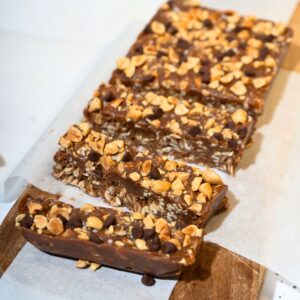
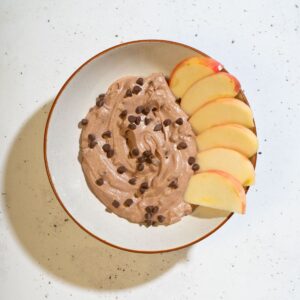
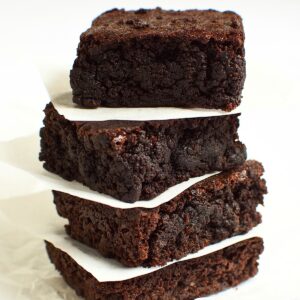

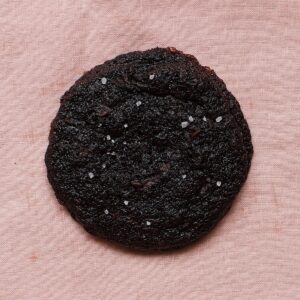





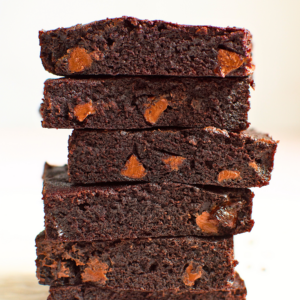

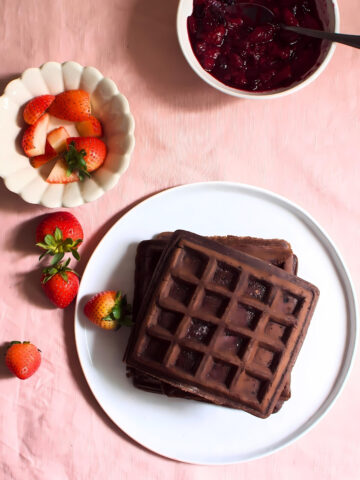
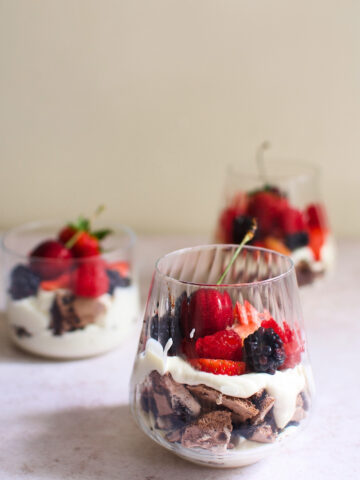

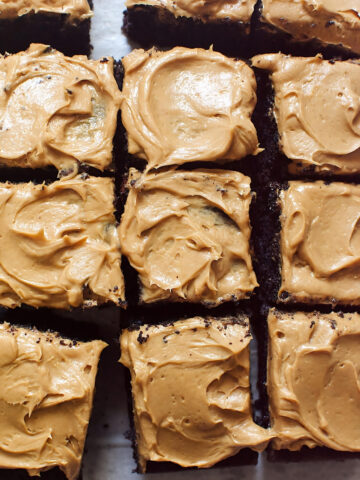
Comments
No Comments